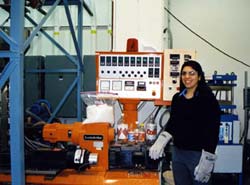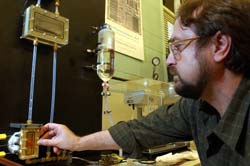This special field revolves around processes for modifying material properties (milling, cooling), composition (filtration, distillation) and type (oxidation, hydration).
Valuable information is available on a broad range of technologies including material separation, laser processes, measuring techniques and robot engineering in addition to testing methods and coating and materials analysis processes.

Photonics and ultrasound engineering researchers from Duke University and The George Washington University have collaborated to design an optical scanner miniaturized enough to be inserted into the body, where its light beams could someday detect abnormalities hidden in the walls of the colon, bladder or esophagus.
The experimental device, called an “electrostatic micromachine scanning mirror for optical coherence tomography,” is described in an article published in the April 15, 2003, issu

Plastics are everywhere these days, but current recycling techniques allow only a very limited portion to be reclaimed after initial use. Researchers in the Department of Chemical Engineering at North Carolina State University, working to change that, have developed a unique recycling process for some of the most common kinds of polymers.
The familiar soda bottle is made of a plastic called polyethylene terephthalate (PET). These bottles are ubiquitous, yet recycling them poses challenges, p

Purdue University researchers have made a discovery that may lead to the development of an innovative liquid-cooling system for future computer chips, which are expected to generate four times more heat than today’s chips.
Researchers had thought that bubbles might block the circulation of liquid forced to flow through “microchannels” only three times the width of a human hair. Engineers also thought that small electric pumps might be needed to push liquid through the narrow channels, incre

A team of Carnegie Mellon University and NASA scientists will travel to the Atacama Desert in northern Chile in April to conduct research that will help them develop and deploy a robot and instruments that may someday enable other robots to find life on Mars. The researchers will be using the Atacama, described as the most arid region on Earth, as a Martian analog.
The group is funded with a $3 million, three-year grant from NASA to the university’s Robotics Institute. They are collabo

Designers at Staffordshire University have come up with a solutions package with the potential to make life a lot easier for everyone.
The University’s Centre for Rehabilitation Robotics has spent more than a year involved in PACKAGE, a £1.5 million European Commission project concerned with making small changes to consumer packaging in a bid to improve “openability”
Now after rigorous trials carried out throughout Europe, the Centre are hoping that the world’s bigg

An effective new approach to preventing sparks when an electrically charged object is earthed could prevent explosions and save lives following a motorway smash involving fuel tankers or other hazardous vehicles. Dr Klaus Schwenzfeuer of the Electrostatic Laboratory at the Swiss Institute for the Promotion of Safety & Security in Basle, will reveal the method at the Institute of Physics Congress at Heriot-Watt University on Monday 24 March.
Earthing a conductive and charged object will almos